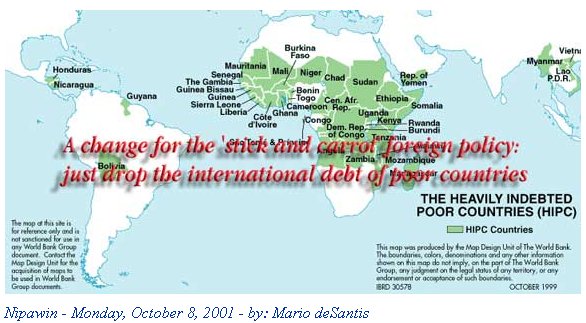Learning Stories
by
Mario deSantis
mariodesantis@hotmail.com
“I am a Canadian, free to speak without fear, free to worship in my own way, free to stand for what I think right, free to oppose what I believe wrong, and free to choose those who shall govern my country.” - -The Rt. Hon. John Diefenbaker, Canadian Bill of Rights, 1960
“The whole judicial system is at issue, it's worth more than one person.”--Serge Kujawa, Saskatchewan Crown Prosecutor, 1991
“The system is not more worth than one person's rights.”--Mario deSantis, 2002
Ensign Stories © Mario deSantis and Ensign
|
|
The White House has been preaching the 'stick and carrot' approach in the course of establishing the coalition against Afghanistan and Osama Bin Laden. In fact, Ari Fleischer, the White House spokesman, has said
I am a bit disturbed about this sloppy style to manage justice and in one way it reminds me of the foreign policy to protect western capitalism with military interventions along with food donations, military interventions (or sanctions) being the stick and food donations being the carrot. I believe that a different world policy is needed, and this policy should not include either the stick or the carrot. What we need is an economic world policy to free our people from poverty, and allow people to produce their own basic food, an overall economic policy Nobel prize winner Amartya Sen calls 'Development as Freedom.' My thought is this, yes, today we must provide food donations for the poor, but in the long run we must build an infrastructure where every country will be free from food donations; and if food is needed that will be obtained not as a donation but as an international exchange of goods and services. And the beginning of a new social foreign policy for the developed countries would be to drop the debt of the poorest countries as such debt is not repayable, it doesn't cost anything to cancel it, and the cancellation of debt would allow a new opportunity for these poor countries to sustain their economic development and become more democratic as they free themselves from poverty, from ignorance and hopefully from their corrupted ruling elites. Some references World leaders flocking to U.S. in show of support. Washington uses carrot with some, stick with others. Jan Cienski, National Post, September 20, 2001 http://www.nationalpost.com/search/story.html?f=/stories/20010920/697059.html An interview with Amartya Sen, the Nobel Prize-winning economist and author of Development as Freedom, The Atlantic, December 15, 1999 http://www.theatlantic.com/unbound/interviews/ba991215.htm Forum on Third World Debt with David Roodman, author of Still Waiting for the Jubilee. (Mario deSantis could not access the World Watch web pages on October 6, 2001) http://csf.colorado.edu/sustainable-economics/third-world-debt/ |
